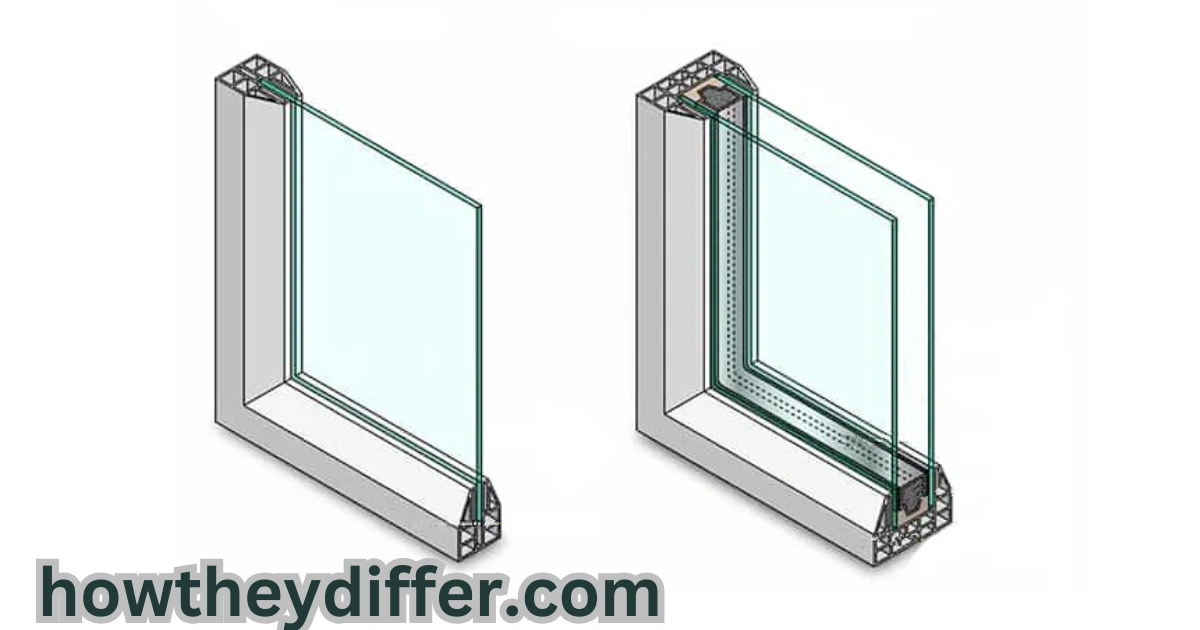Imagine standing next to a window on a cold winter day. Do you feel a chill even though the window is closed? That’s because heat can easily escape through a single pane of glass. Now imagine standing next to a different window, and this time, you feel cozy and warm. This window probably has two panes of glass instead of one.
Windows are like doorways for light and air, but they can also let in unwanted noise and uncomfortable temperatures.
Understanding the difference between double pane and single pane windows can help you make your home more comfortable, save money on energy bills, and even help the environment! This article will clearly explain those differences so you can make the best choice for your home.
What are Single Pane Windows?
Single pane windows are exactly what they sound like: windows with a single layer of glass. They were the most common type of window for many years, but they have some drawbacks, especially when it comes to energy efficiency.
What are Double Pane Windows?
Double pane windows have two layers of glass with a space between them. This space is usually filled with air or a special gas like argon. This design makes a big difference in how well the window insulates your home.
Double Pane and Single Pane Windows: Closer Look
Let’s take a closer look at the main differences between double pane and single pane windows.
Energy Efficiency
- Single Pane: Heat can easily pass through a single layer of glass. This means in the winter, your home’s heat can escape outside, making your house colder and forcing your furnace to work harder. In the summer, the sun’s heat can easily enter your home, making it hotter and forcing your air conditioner to work harder.
- Double Pane: The space between the two panes of glass in a double pane window acts as an insulator. This means less heat escapes in the winter and less heat enters in the summer. This helps keep your home at a comfortable temperature and reduces your energy bills.
Noise Reduction
- Single Pane: Single pane windows offer little protection against outside noise. If you live in a noisy area, like near a busy street or airport, you’ll likely hear a lot of that noise inside your home.
- Double Pane: The two layers of glass and the space between them help to reduce noise transmission. This means a quieter and more peaceful home environment.
Condensation
- Single Pane: In cold weather, the surface of single pane windows can get very cold. When warm, moist air inside your home touches this cold surface, it can cause condensation (water droplets) to form on the window. This can lead to problems like mold growth and damage to window frames.
- Double Pane: Double pane windows are less likely to form condensation because the inner pane of glass stays warmer.
| Feature | Single Pane Windows | Double Pane Windows |
|---|---|---|
| Energy Efficiency | Low | High |
| Noise Reduction | Low | High |
| Condensation | More prone | Less prone |
| Cost | Lower upfront cost | Higher upfront cost |
Benefits of Double Pane Windows
Switching from single pane to double pane windows can provide several benefits:
Cost Savings
While double pane windows cost more to buy initially, they can save you money in the long run by reducing your energy bills.
Increased Comfort
Double pane windows help maintain a more consistent temperature in your home, making it more comfortable year-round.
Reduced Noise
Enjoy a quieter home with less noise pollution from outside.
Environmental Impact
By reducing energy consumption, double pane windows contribute to a smaller carbon footprint and a healthier environment.
Are Double Pane Windows Always the Best Choice?
While double pane windows offer many advantages, there are a few situations where single pane windows might be a suitable option:
- Mild Climates: If you live in an area with very mild weather, the extra insulation of double pane windows might not be necessary.
- Historic Homes: In some cases, replacing original single pane windows in a historic home might not be allowed or desirable for maintaining the home’s historical accuracy.
- Budget Constraints: If your budget is very tight, single pane windows might be the more affordable option upfront.
However, even in these situations, the long-term benefits of double pane windows often outweigh the initial cost.
Conclusion
The difference between double pane and single pane windows is significant, particularly when considering energy efficiency, noise reduction, and overall comfort.
While single pane windows might seem like a more budget-friendly option initially, double pane windows offer substantial long-term value.
By investing in double pane windows, you can create a more comfortable, energy-efficient, and peaceful home environment.
FAQs
Some of the frequently inquired questions regarding the differences between double pane and single pane windows are as follow:
What is the space between the glass panes in a double pane window called?
It’s called an air space or, if filled with gas, a gas-filled space.
Can I replace my single pane windows with double pane windows myself?
While it’s possible, window installation can be tricky. It’s often best to hire a professional for proper installation.
What type of gas is used in double pane windows?
Argon is the most common gas used in double pane windows because it’s an excellent insulator.
Are there triple pane windows?
Yes, triple pane windows have three layers of glass and offer even greater energy efficiency than double pane windows.
How do I clean double pane windows?
You can clean double pane windows just like single pane windows, using glass cleaner and a soft cloth. Be careful not to get cleaner in the window frame.
